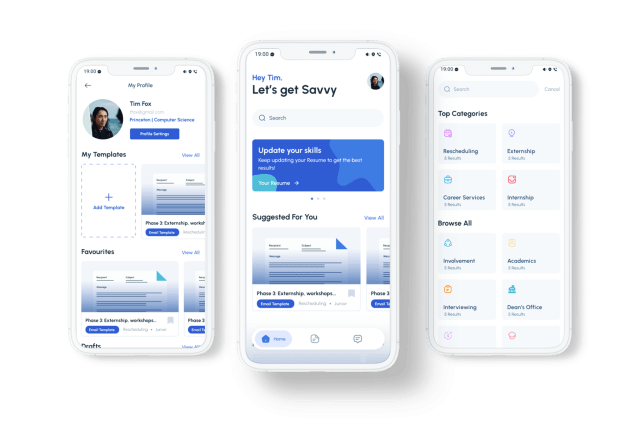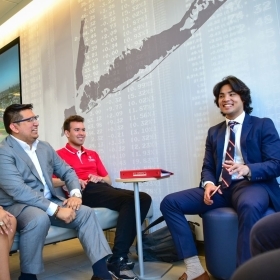How to Get Started in Risk Management as a College Student

If you are a college student aspiring to pursue a career in risk management, then you are on the right track. This field is constantly growing and has a bright future ahead of it. It offers a plethora of fascinating career paths, including risk consulting.
Ivans Esperance ’20TCB, ’21MS, is a Senior Risk Consultant who graduated from St. John’s University with a master’s degree (M.S.) in Risk Management and Risk Analytics. In this exclusive Q&A, he shares his insight into a career in risk consulting, reflecting on his educational journey and the evolving landscape of risk management in the coming years.
What led you to pursue a career in risk management?
Learning to manage potential risks associated with different aspects of my life, career, and personal business piqued my interest. As a college student, you have a ton of risk, and the biggest is the investment in college.
I explored this idea further during my master’s degree and created an app called CollegeSavvy that offers personalized guidance for students to increase their success rate in college. I am proud to say the app won first place in the James and Eileen Christmas Business Plan Competition and Pitch Event through The Peter J. Tobin College of Business.
Related: Business Plan Competition Excels with Entrepreneurial Pitches
Did you participate in any extracurricular activities in college that have helped your risk management career? If so, what skills did you acquire?
I served as an Athletic Facilities and Operations student worker through the Red Storm Athletics Department during all four years at St. John’s. That experience made my college experience even more special. The most valuable skills I gained through that role are teamwork, interpersonal skills, and the ability to trust.
A big part of my role was coordinating sports events; we had to manage all the personnel and staff. With a role like this, I had to know how to function as a team. As a Senior Consultant, this skill has been highly transferrable. We work with cross-functional teams from different parts of the country. Knowing that I could trust my team members with the deliverable or giving a presentation to a client is essential to our work.
Did mentorship have an impact on you throughout your college journey?
Absolutely! One mentor I had was my management professor, Niall C. Hegarty, Ed.D. He wrote my recommendation letter to the Office of Graduate Admission so I could apply for my master’s degree. I took two of his courses on leadership, and both were amazing. I credit him for being the professor who made me want to step into a leadership role.
My career adviser at University Career Services also played a crucial role in my professional opportunities. Even though it has been two years since college, we still have a great relationship.
Did you complete any internships during or after college? If so, how did this internship opportunity shape your career aspirations and provide a foundation for your current role as a senior consultant?
I completed a consultant internship through Proviti Inc., a global business consulting firm, and had a fantastic experience. The company provides interns with pretraining before they start an internship. During that time, I learned different skills, such as interviewing clients, conducting myself professionally, researching effectively, and delivering presentations appropriately, among other things. I could carry over everything I learned by the time I was ready to begin the internship. Proviti does an excellent job of laying the foundation for a successful career in risk management.
What is one thing about working in risk management you didn’t know before but know now?
Understanding what a subject matter expert is. That was something I had yet to think much about before. It was taught in my management classes, but when I became a risk consultant, I realized the importance of having a crucial subject matter expert in a specific field. As a consultant, your knowledge helps the client determine whether they want to work with you. Now that I am a senior consultant, I’ve had to focus and find my niche.
In many cases, what we learn in class is highly conceptual. However, as a professional, I have realized the value of that knowledge. Looking back, I can see that my professors were right all along.
What are the essential skills and qualities should a successful risk management professional possess?
Firstly, analytical skills to identify the client’s real problem. Providing solutions requires a deep understanding of the problem, which can only be achieved by analyzing it thoroughly. Analytical skills help consultants focus on the problem’s root cause instead of just the surface-level issue. Sometimes, the clients might only describe one problem, but after analyzing it, we find it is entirely different.
Another critical skill is overall management skills. We work with multiple clients simultaneously within four to five months. Managing and organizing information while delivering quality work to clients is critical.
Lastly, communication. My role as a risk consultant is client-focused and client-facing, and we interact with clients daily. The ability to communicate effectively, whether in a professional or friendly manner, is vital to building and maintaining a solid client relationship.
Lastly, how do you see the field of risk management evolving in the coming years, and what opportunities do you anticipate for professionals entering this field?
If you are looking to pursue a career in risk management, then there is a lot of potential for you in the future.
The industry is increasingly focusing on Enterprise Risk Management (ERM). Regarding job opportunities in the sector, Environmental, Social, and Governance Risk Management (ESG) is currently the most in-demand area. Companies are now held more accountable for the impact of their operations on the environment and society than ever before. Investors are also showing increased interest in ESG factors while selecting investments.
What advice do you have for future or current St. John’s students who aspire to follow a similar career path?
The Tobin School of Business offers the Executive-in-Residence Program (EIRP), which provides students an opportunity to engage in real-world business consulting with actual organizations and nonprofits. That’s an excellent opportunity to see whether a career in risk is a right fit for you.
Also, reach out to professionals already in the industry who can provide mentorship and insight into a consultant’s day-to-day activities and responsibilities.
Thank you, Mr. Esperance, for your insights in the risk management field! Check out these other great success stories in risk management:
Global Travel and Career Success: How This Alumna Built a Thriving Career in Risk Management
Navigating Risk: Sasha Arkhangelska’s Journey to Excellence in Enterprise Risk Management
Ready to explore Risk Management and Risk Analytics?
The St. John’s University Maurice R. Greenberg School of Risk Management, Insurance and Actuarial Science provides a pathway to an exciting career in this dynamic field. Start your journey today!
“The Maurice R. Greenberg School of Risk Management, Insurance, and Actuarial Science is ranked 9th among other national programs (according to a 2023 U.S. News & World Report.) That validated the quality of education I would receive.”
—Ivans Esperance ’20TCB, ’21MS, Senior Risk Consultant, Proviti Inc.







